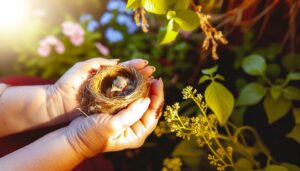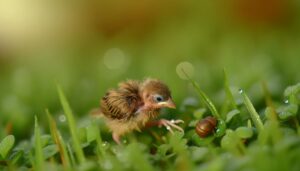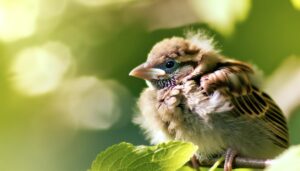10 Steps to Make Nutritious Homemade Baby Sparrow Food
To make homemade baby sparrow food, start by mixing boiled eggs, ground mealworms, and a commercial hand-feeding formula. This combination ensures a consistent blend of proteins and essential nutrients.
Add crushed insects like mealworms or crickets for additional protein, essential for muscle and feather development. Incorporate soft fruits such as apples or pears for vitamins; mash or blend them for easier ingestion.
Include finely crushed eggshells for calcium. Store the mixture properly, label containers with the preparation date, and use the oldest food first.
Maintaining a balanced diet is key for the sparrow's growth and well-being. Discover more for detailed instructions and tips.
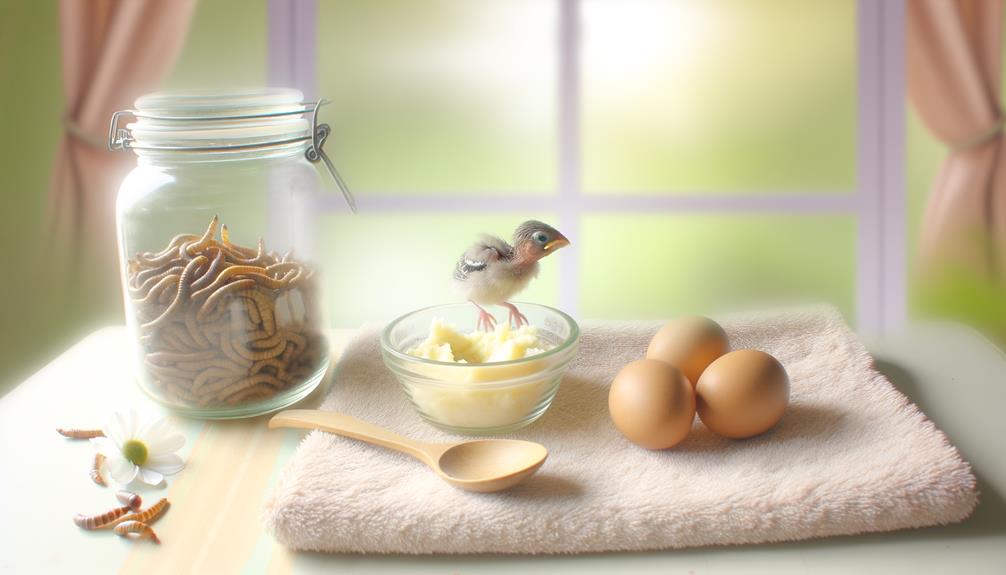
Key Takeaways
- Mix boiled eggs, ground mealworms, and hand-feeding formula: Ensure a uniform consistency for essential nutrients.
- Add protein sources: Include crushed insects like crickets or mealworms for muscle and feather development.
- Incorporate soft fruits: Use diced, pesticide-free apples or pears, mashed for easy ingestion.
- Balance nutrients: Combine protein, fruits, and finely crushed eggshells for calcium.
- Monitor food freshness: Label containers with preparation dates and use the oldest food first.
Necessary Ingredients
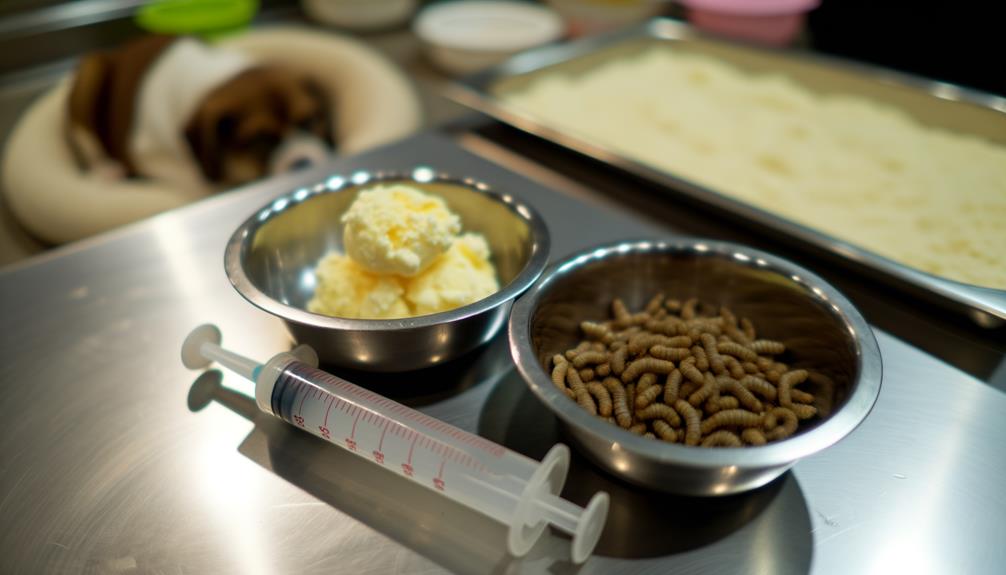
To prepare homemade baby sparrow food, you'll need a precise blend of high-protein ingredients like boiled eggs, mealworms, and a high-quality commercial hand-feeding formula. First, hard-boil an egg and finely chop it to guarantee easy digestion.
Mealworms, either live or dried, should be ground into a manageable size. They're excellent for providing essential fats and proteins.
Next, select a commercial hand-feeding formula specifically designed for small birds; it guarantees balanced nutrition. Combine these ingredients in proportions that mimic the natural diet of baby sparrows.
Typically, mix two parts egg, one part mealworms, and one part formula. This blend supports rapid growth, feather development, and overall health, meeting the nutritional needs of young sparrows effectively.
Preparing the Base
Start by thoroughly mixing the finely chopped boiled egg, ground mealworms, and commercial hand-feeding formula until you achieve a uniform consistency. Use a clean, sterile mixing bowl to prevent contamination and guarantee the ingredients blend evenly.
This base provides essential nutrients for baby sparrows, promoting their growth and development. The boiled egg offers high-quality protein and vitamins, while the ground mealworms contribute additional protein and amino acids. The commercial hand-feeding formula supplies essential vitamins and minerals, guaranteeing a balanced diet.
Mix using a sterile spoon or spatula, breaking any clumps to maintain a smooth texture. Consistency is pivotal; it ensures the food can be easily ingested and digested by the baby sparrows.
Adding Protein
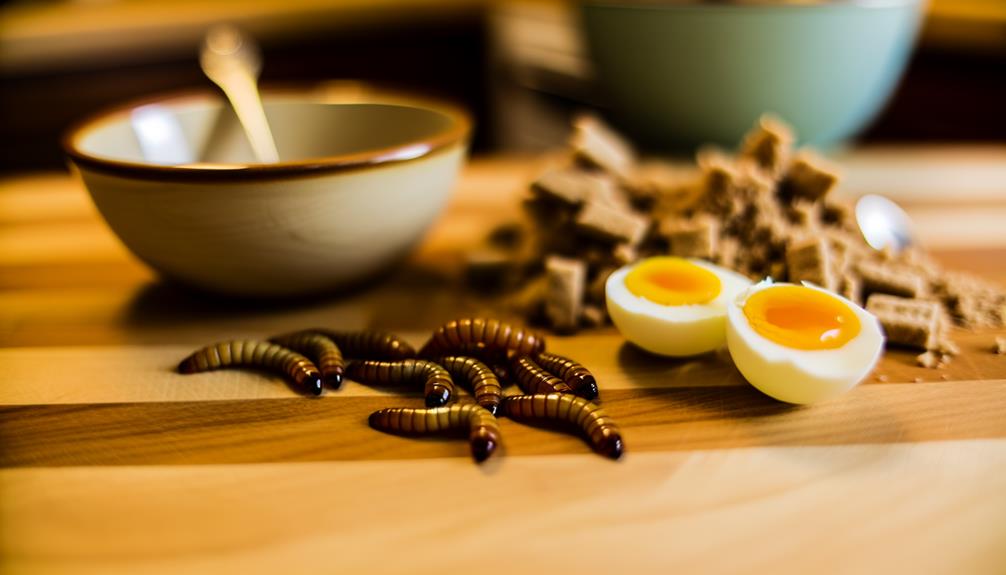
In addition to the base mixture, incorporating finely crushed insects such as crickets or additional mealworms boosts the protein content, ensuring the baby sparrows receive ample nutrition for optimal growth. Protein is essential for the development of their muscles, feathers, and overall health. You should aim to achieve a balanced diet by mixing these protein sources in appropriate amounts.
Here's a suggested protein source guide:
| Protein Source | Recommended Amount |
|---|---|
| Crickets | 1 teaspoon, crushed |
| Mealworms | 2 teaspoons, crushed |
| Hard-boiled egg yolk | 1 small piece, mashed |
| High-protein baby cereal | 1 tablespoon |
Incorporating Fruits
When incorporating fruits into the baby sparrows' diet, select soft, easily digestible options such as apples, pears, or berries to provide essential vitamins and antioxidants. Start by washing the fruits thoroughly to remove any pesticide residues.
Peel and finely dice the fruits, making sure there are no seeds or pits that could pose a choking hazard. You can mash the fruits into a smooth paste or blend them with a small amount of water to achieve a puree consistency. This guarantees the baby sparrows can easily swallow and digest the food.
Introduce these fruits gradually, monitoring the birds for any adverse reactions. By doing so, you'll provide a balanced, nutritious diet that supports their growth and overall health.
Balancing Nutrients
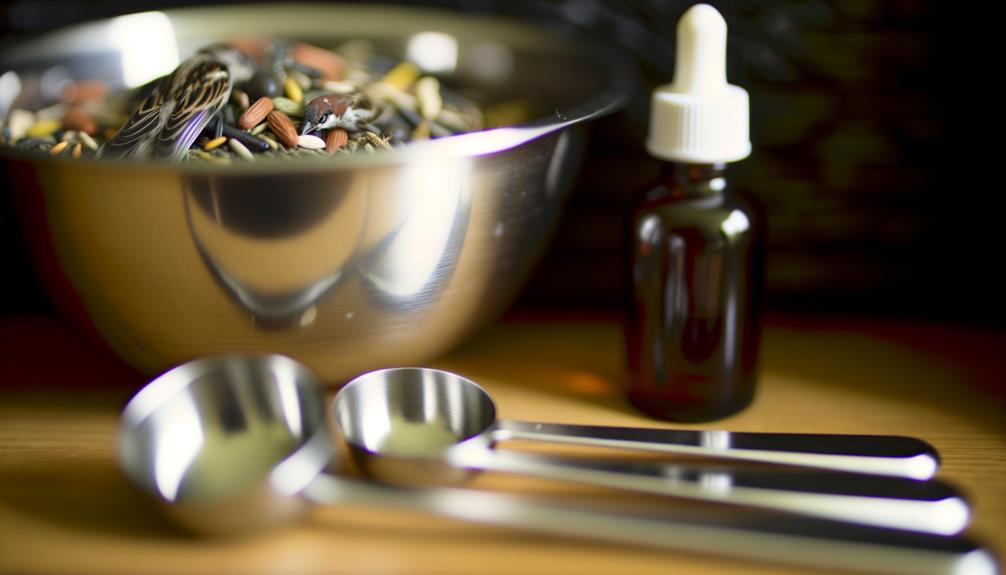
Ensuring a well-rounded diet for baby sparrows involves balancing nutrients by combining protein sources like insects with the vitamins and antioxidants found in fruits.
You'll need to provide a mix of finely chopped boiled eggs and mealworms to meet their high protein demands, essential for growth and feather development.
Supplement these with small portions of berries or apple slices to supply essential vitamins like A, C, and E, enhancing their immune systems.
Don't forget to include calcium sources, such as finely crushed eggshells, to support bone health.
Proper Mixing Techniques
Proper mixing techniques are crucial for ensuring baby sparrows receive a consistent and balanced nutrient intake. Begin by measuring each ingredient accurately using a digital kitchen scale.
Combine the dry ingredients first, making sure they're thoroughly blended to prevent clumping. Gradually add water, stirring continuously to achieve a smooth, homogenous mixture. Aim for a consistency similar to that of thin oatmeal, optimizing it's neither too thick nor too watery.
Use a whisk or a hand blender for best results, as they help break down any lumps. Finally, make sure the mixture is at room temperature before serving. Consistent texture and temperature are critical for proper digestion and nutrient absorption, ultimately supporting the baby sparrow's growth and development effectively.
Feeding Schedule
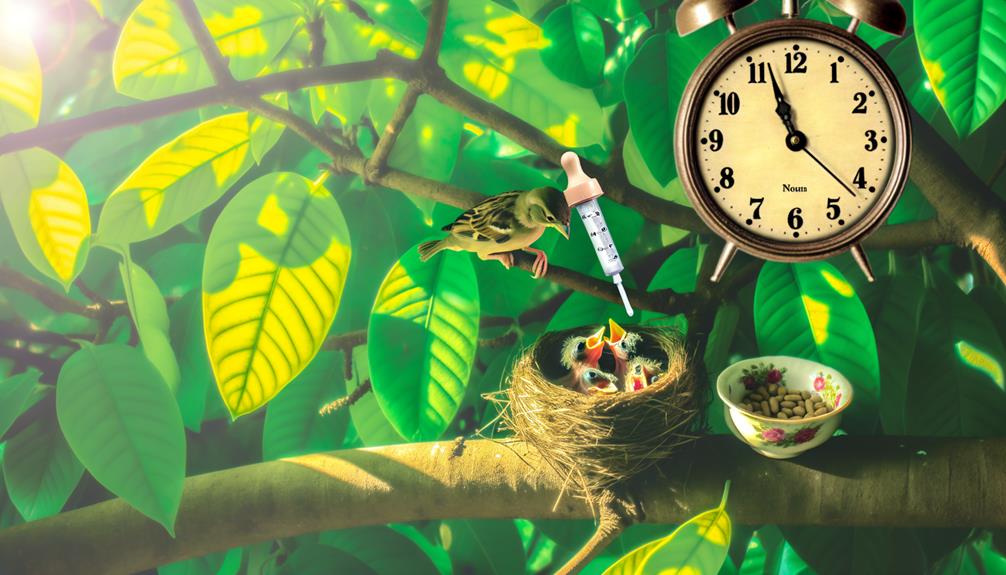
You need to establish a precise feeding schedule for baby sparrows, focusing on frequency, portion sizes, and nighttime routines.
Feed them every 2-3 hours during the day, providing small portions to prevent overfeeding.
During the night, guarantee at least one feeding to maintain their energy levels and support growth.
Frequency of Feedings
Feeding a baby sparrow requires a consistent schedule, typically every 15-20 minutes from dawn until dusk during its first week of life. This frequency mimics the natural feeding pattern provided by parent sparrows.
You'll need to be watchful and systematic, guaranteeing the chick receives adequate nutrition to support rapid growth and development. Keep a feeding log to monitor times and avoid missed feedings.
To efficiently manage your feeding schedule:
- Set an alarm to remind you every 15-20 minutes.
- Prepare food in advance to minimize delays.
- Use a syringe or dropper for accurate delivery.
- Monitor chick's response to ensure proper digestion.
- Adjust schedule slightly as the chick grows, reducing frequency gradually.
Consistency and attentiveness will secure the baby sparrow thrives.
Portion Sizes
Typically, you should offer very small portions, about 1-2 drops of food, every 15-20 minutes to ensure the baby sparrow's digestive system can handle the intake and nutrients are absorbed efficiently. This interval mimics the natural feeding pattern provided by sparrow parents.
Use a dropper or a small syringe to deliver the food precisely, ensuring the baby sparrow doesn't aspirate or choke. Monitor the chick's response closely; a full crop indicates it's had enough. Adjust the portion size if you observe any signs of overfeeding or discomfort.
Consistent timing helps establish a reliable feeding schedule, vital for the chick's growth and development. Remember, maintaining these small, frequent feedings is essential for the fledgling's survival and well-being.
Nighttime Feeding Routine
During the nighttime, it's crucial to maintain a consistent feeding schedule to support the baby sparrow's metabolic rate and overall health. Sparrows have high metabolism rates and need regular feeding, even at night.
Set alarms to make sure you wake up for feedings. Follow these guidelines:
- Frequency: Feed every 2-3 hours.
- Portion Size: Use a small syringe to deliver precise amounts.
- Temperature: Guarantee the food is warm, around 100°F (37.8°C).
- Positioning: Hold the sparrow upright to prevent aspiration.
- Hygiene: Clean feeding tools after each use to prevent infections.
Storage Tips
Make certain you store homemade baby sparrow food in an airtight container to preserve its freshness and nutritional value. Place the container in the refrigerator if you plan to use the food within 48 hours. For longer storage, freeze portions in ice cube trays, then transfer the cubes to a freezer-safe bag.
Here's a quick reference:
| Storage Method | Duration | Temperature |
|---|---|---|
| Refrigerator | Up to 48 hours | 4°C (40°F) |
| Freezer (ice cubes) | 1-2 months | -18°C (0°F) |
| Room Temperature | Not recommended | N/A |
Always label your containers with the date of preparation to make certain you use the oldest food first. This practice helps maintain the highest quality and safety for the baby sparrows you're nurturing.
Conclusion
To sum up, crafting homemade baby sparrow food guarantees your little feathered friends receive the nourishment they need to thrive. Combining the right ingredients and balancing nutrients can be a bit of a science experiment, but it's worth the effort.
By following a proper feeding schedule and storing the food correctly, you'll be giving these delicate creatures a robust start in life. So, embrace this rewarding challenge and watch your tiny charges flourish under your care!


